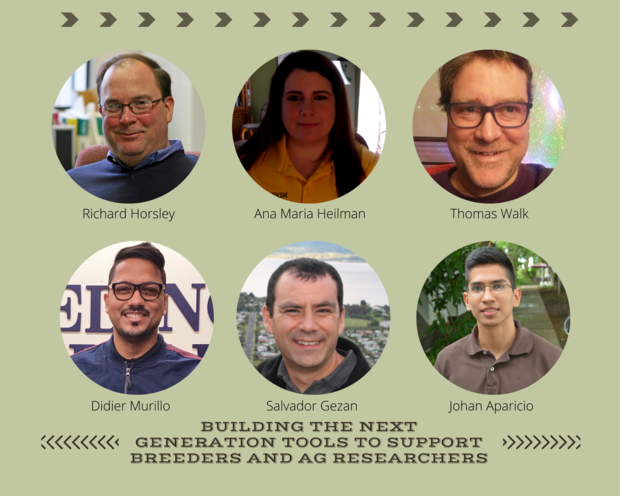
The Breeding Pipeline Database Management team in the NDSU Department of Plant Sciences is creating tools and platforms to speed and streamline the entire plant breeding process.
The success of a plant breeding program depends on millions of data points collected from phenotypic observations of plants in the field, genetic and genomic information, biochemical measurements of physiological and food safety characteristics and quality factors of crop products.
The team’s project is a centralized, dedicated effort that is focused on helping NDSU breeding programs. Its interdepartmental and collaborative approach with other universities, non-profit organizations and industry strengthens NDSU breeding efforts.
Ana Heilman-Morales and Tom Walk coordinate the pipeline breeding efforts and offer automated solutions to breeding programs with the help of statistician and mathematician Didier Murillo-Florez, all under the leadership of barley breeder and department head Richard Horsley.
The team develops tools to manage data and projects for all the stages of variety testing, data management, experiment creation, statistical analysis, selection and final reporting of results. Heilman-Morales is a plant breeder and data manager, and Walk is a plant scientist and platform administrator.
Ten traditional breeding programs at NDSU work closely with the team. Dry edible bean breeder Juan Osorno, durum breeder Elias Elias, hard spring wheat breeder Andrew Green, hard red winter wheat breeder Francois Marais, oat breeder Michael McMullen, oilseed breeder Mukhlesur Rahman, potato breeder Susie Thompson, pulse breeder Nonoy Bandillo, soybean breeder Carrie Miranda and Horsley advise and consult with the team to develop and learn new technology and methods for their data management needs.
The team is collaborating with two international Linear Mixed Models and spatial analysis experts. Johan Steven Aparicio is a statistician and research associate at the International Center for Tropical Agriculture, Cali, Colombia, and Salvador Alejandro Gezan is a quantitative geneticist and statistician consultant at VSN International, Hemel Hempstead, United Kingdom. The goal of the collaboration is the development of two tools – one used for the creation of randomizations or design of experiments, called FielD·Hub, and the second used for the analysis of experiments using LMM and spatial analyses, called Mr.Bean. Both tools can be found in Github.
FielD·Hub significantly advances experimental design options available to plant breeders. In this R Shiny app, users can quickly generate experimental designs, rapidly randomize experiments, and automatically produce reports that are refreshed as users change selections. FielD·Hub also has simulation features that are useful for assessing designs and training future plant breeders.
Mr.Bean is an R Shiny app that simplifies the analysis of large-scale plant breeding experimental analysis by using the power and versatility of LMM. The app combines the analytical robustness and speed of ASReml and SpATS with the visual power offered by R. Mr.Bean provides a graphical workflow for importing data, identifying outliers and fitting field data using LMM with or without spatial correction. In addition, Mr.Bean also provides a module for exploring results from METs using several graphical and multivariate techniques.
There also is a third tool that was deployed to the breeders in 2020 called Ag.Q.Hub, which is a JMP add-in that helps to accelerate the querying processes of breeding lines, while providing additional analytical options to the breeders. The promise of Ag.Q.Hub is to expedite the breeding data analysis from plant breeding trials by quickly opening complex datasets and distribution charts in JMP, the graphical statistics and visualization program made by SAS.
Future plans of the team include migrating data and apps to scalable systems at NDSU or in the cloud, improving management and analysis of phenotypic, genomic and image data, developing more output tables and graphics, offering more dynamic graphical apps and creating an agile development environment for contributors.
As a student-focused, land-grant, research university, we serve our citizens.

